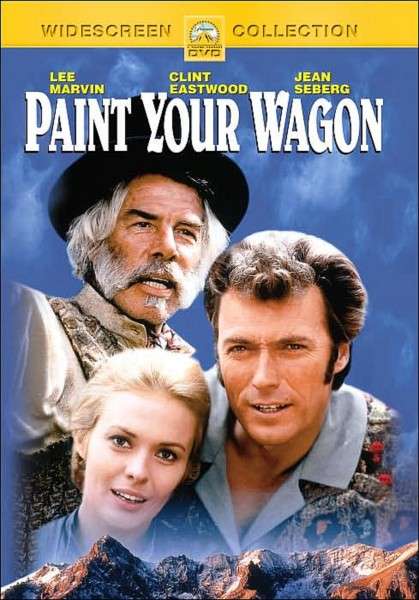Paint Your Wagon

Remember the Simpsons clip show episode "All Singing, All Dancing" where Bart and Homer rent a Clint Eastwood and Lee Marvin movie titled Paint Your Wagon and expect it to be a bloody shoot-em-up Western (much like The Good, the Bad and the Ugly or A Fistful of Dollars), only to discover it's a cheesy, flaccid musical?
Yeah, the Simpsons writers didn't make that up.
This somewhat obscure 1969 movie musical was based on a Broadway musical by Lerner and Loewe (the authors of Brigadoon and later My Fair Lady), with which it shares a number of characters and songs but not much plot.
When a wagon crashes into a ravine, Prospector Ben Rumson (Marvin) rescues the surviving occupant (Eastwood). The two form a partnership, and Ben dubs the survivor "Pardner". By the riverside where the wagon crashed, gold is discovered, and a boom town called "No Name City" promptly crops up.
The population of No Name City is initially all male, and the said men get horny. They are thus delighted when a Mormon with two wives rides into town one day. They convince him to sell one of them, Elizabeth (Jean Seberg), to the highest bidder. Ben, in a drunken stupor, wins the bid.
A cabin is constructed for Ben and Elizabeth and the two settle into a happy marriage. But the remaining men are still horny, and Ben starts to get overprotective of Elizabeth. So the men concoct a scheme to kidnap six prostitutes from a neighboring town. Ben heads the mission, leaving Elizabeth in Pardner's care. Whilst he is away, the two fall in love. When Ben gets back, the scheme a success, Elizabeth convinces him and Pardner to enter a polyandrous marriage with her.
With the abduction of the prostitutes successful, a brothel is established. Men come from miles around for a lay, and No Name City grows into a thriving town. Presently, a preacher named Parson arrives and decries all the gambling and hooking, claiming that God will make the earth swallow the town. As it happens, some of the townsfolk dig tunnels beneath the town to collect gold dust that falls through the floorboards of the buildings above. It looks like Parson might turn out to be correct...
This flick had all the aspirations of a major blockbuster, but there were two problems. Firstly, Lee Marvin can't sing. Secondly, by the time it was released big budget musicals were on their way out. Sure enough, it bombed at the box office. This was the last film to be directed by Joshua Logan.
- Adapted Out: Jennifer and Julio aren't in the film's adaption.
- All Men Are Perverts
- Chivalrous Pervert: 'Mrs.' Rumstead is treated with scrupulous respect even if the men do look at her like children at a candy display.
- Boom Town
- City with No Name: Lampshaded with No Name City, though it was probably chosen to represent the countless Boom Towns and Ghost Towns left by the gold rush.
- Crowd Song
- The Cassandra: The Parson's warnings about the town being swallowed up by sin.
- Everything's Better with Cows: The golden calf and the bull.
- Fashion Dissonance: Very much averted with the local hippies who were used as extras for the film (this was made in The Sixties, remember). Their clothes and hair were already so in tune with the Gold Rush aesthetic that they didn't even need costumes or makeup.
- Forty-Niner/Prospector: Most of the characters.
- Gold Fever: The motivation behind most of the hilarity that ensues, especially for Ben Runsom.
- No Name Given / Everyone Calls Him "Barkeep": Ben's Pardner (until the end, anyway).
- No Woman's Land
- Polyamory: Well, they tried it, at least.
- Real Is Brown
- Soiled City on a Hill: No Name City
- Tenchi Solution
- Wanderlust Song: "Wandering Star" in the graveltastic voice of Lee Marvin. "Elisa" and "They Call the Wind Maria" is a good counterpart to this, dealing with the loneliness of a wandering life.
- Welcome to Hell, Parson. No Name City, Population: drunk.
- The Western
- The Wild West
In answer to the above caption; yes. Roger Ebert compared the two movies too.